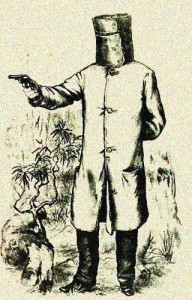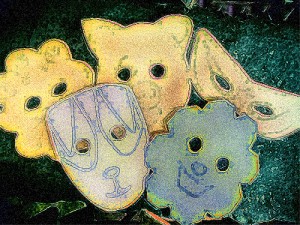Editorial

The idea of the mask is intrinsic to literature: a poem presents a verbal surface which represents a constructed guise of some sort through which the author speaks. Even the most confessional or apparently personal of poems constructs a speaking identity that is to some extent fictional: the term ‘persona’ is often used to signify this aspect of a literary text.
But for Shit Creek Review writers, the topic of ‘Masks’ elicits far more than this basic notion. Look: here a face is hardened into a mask by alcohol abuse and the friction of time. Or wear the dead man’s mask and mouth his verse with gusto; put on the Goddess’ mask to shop for crocodiles’ tongues. Hawk’s head and horse’s head: a young girl flares her nostrils; an avatar is caught fast in the Net. A masked ball prophesying war; the masks of the Commedia dell’Arte winking from the shadows. The death masks into which we compose our faces are reflected back to us from darkened glass or from mirror. Masks behind masks — and masks behind masks behind masks, back past the archetypes, until the reader dizzily peers at mirrored masked reflections, endlessly retreating.
Such were the bizarre thoughts that flashed thought the moonshine-muddled brains of your editors as they capered and cavorted around the little campfire glowing on the bank of the farthest reaches of Shit Creek. Now, inscrutable behind their own various guises, they have paddled this small canoe laden with masks all the way along Shit Creek to you. They want to trade these masks for your time and attention. Please receive them wearing your own mask of genial kindness.
~~~
Editors’ Picks
Paul: I always respond to Mark Allinson’s poetry, and this one epitomises why. It has a strongly graphic quality that appeals to me; as does its drama, its wit, its exploration of the metaphysics of ‘Mask’. Carefully-placed ripples in the iambic pentameter set up just the right sense of disturbance as its tight rhyme scheme strives to contain the nemo that begins to yawn open, with the insistent repetition of the ‘face’ rhyme enacting a quietly terrified compulsion.
Pat: ‘The Masked Ball’ by Charlotte Runcie. Charlotte’s vivid imagination captured me immediately. I like her use of color and descriptive language, the way the poem circles not only the subject of being masked, but also back to the beginning image with “ bites of savage butterflies”. I was delighted from the first line to the last and continue to be each time I come back to re-read The Masked Ball.
Angela: My choice is R Nemo Hill’s ‘We Shall Entertain you’. I have read it a number of times, to enjoy the superb use of sound and the sense of disturbance invoked, which is so fitting for the surrealists. I especially enjoyed the juxtaposition of the surrealist’s playful horror with the real horror of the Great War.
Nigel: My pick is Murphy’s small, polished but ultimately equivocal piece ‘The Cask Master’. It reminds me of Eisenheim’s locket in ‘The Illusionist’, that in its simplicity betrays a deeper hidden love-within-a-love. Here Murphy’s secret slavery to the power of whisky is a deeper secret within his demi-monde of homosexuality. The irony of the title is not lost: a clever, poignant and beautifully crafted piece of pain.
Don: In the past I’ve tried to write both of Jan’s poems. They are exquisite.
 |
